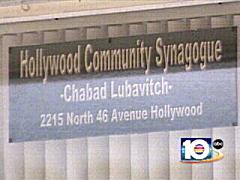
Hollywood Violated Chabad Settlement, Lawyer Contends
HOLLYWOOD, FL — In a new twist to a Hollywood legal battle many thought was over, the attorney who represented an orthodox Jewish synagogue in its feud with the city is alleging the city violated the settlement — causing problems for yet another religious institution.
Fort Lauderdale attorney Franklin Zemel, who represented Hollywood Community Synagogue Chabad Lubavitch in the five-year legal battle, filed a motion in federal court Friday on behalf of another Hollywood house of worship that aims to open just blocks from City Hall.
The lawyer wants Hollywood officials to explain why they should not be held in contempt of court for violating the settlement agreement reached with Chabad Lubavitch in 2006.
As part of that settlement, the city was required to revise part of its zoning code after a federal judge declared the code unconstitutional because it could be unfairly used to discriminate against houses of worship.
But three years later, according to the motion filed Friday, the code still has not been properly changed.
”The city never complied with this court’s clear and unambiguous directive and has been flagrantly . . . disregarding the court’s order for years,” the motion reads.
Hollywood officials did not immediately return calls for comment.
Friday’s motion was filed on behalf of St. Gregorio’s Orthodox Church of India, which became tangled in the synagogue dispute after the church could not secure city permission to open its doors.
St. Gregorio’s bought the building at 29th Avenue and Taylor Street earlier this year, property that had served as a lodge operated by the Ukranian American Freedom Foundation. The new owners want to renovate the building for use as a house of worship and have filed a separate motion to intervene in the chabad case.
The church filed the application and paid the fee required to operate as a church, but objected when the city told church leaders they would need to apply for a special permit.
Friday’s legal move reignites a battle resolved in 2006 after the city tried to stop an Orthodox synagogue from operating inside two Hollywood Hills homes.
Chabad Lubavitch was using the homes in 2001 when residents bombarded the city with complaints about noise, overflowing trash bins and illegally parked cars. The city tried to kick the synagogue out of the neighborhood and eventually filed a lawsuit against Chabad Lubavitch, alleging that it violated city zoning rules.
The synagogue countered with several lawsuits of its own. After several pretrial defeats, the city offered to pay a $2 million settlement, ending that feud in July 2006. The settlement allowed the congregation to stay in the homes as well as expand to three other houses.
The newest legal tussle focuses on the portion of the settlement involving zoning criteria the city uses to grant permits to religious groups seeking to operate in neighborhoods with single-family homes.
A federal judge ruled that the old criteria were unconstitutional, saying the requirements for applying for a ”special exception” permit are too vague and that the approval process could be manipulated.
The permits are required for religious groups to operate houses of worship in single-family areas, and Hollywoood asked St. Gregorio’s to apply for one earlier this year.
But the church argues it shouldn’t have to follow a process that has been rejected in court.
”The city of Hollywood is essentially stonewalling St. Gregorio’s by requiring them to comply with a code previously deemed unconstitutional by the court,” Zemel said in a written statement. “It is incomprehensible that they would openly defy three federal court orders to replace its unconstitutional code.”












